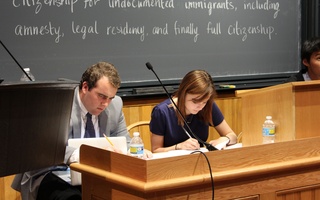{shortcode-6985761d983342f2144389ed3d676f262e174325} Speaking to a large crowd at the John F. Kennedy Jr. Forum on Wednesday, History professor Niall C. Ferguson discussed the biography and political ideas of Henry A. Kissinger ’50.
Ferguson, who published the first volume of a biography on the former secretary of state in September, said last month that he will leave Harvard for Stanford’s Hoover Institution after what he said has been “12 wonderful years.” He plans to continue working on a second biographical volume on Kissinger as he moves to California.
At the event Wednesday, Ferguson said Kissinger’s private papers revealed that the former secretary of state and Harvard professor was very different from both what he expected and what previous historians had found.
“The key point about this book is that it’s certainly not the Henry Kissinger you’ve come to expect,” Ferguson said, adding that, even though he expected Kissinger to be an “American Machiavelli,” he realized that he was very idealistic during his early political career.
Answering a question on the parallels between Ferguson and Kissinger’s lives from event moderator Mary Sarotte, an associate at the Center for European Studies, Ferguson said his research was also motivated by an interest in Harvard’s history and the University’s role as a source of appointments in the federal administration.
“I think it was partly being here [at Harvard] that inspired me to do the book,” he said. “I was partly trying to teach myself about Harvard.”
Ferguson also spoke about the impact that Kissinger’s background in history had on his foreign policy ideas. The former secretary of state approached international relations as “applied history,” Ferguson said.
Simone E. A. Abegunrin ’18, who asked Ferguson about Kissinger’s potential views on the Iran nuclear deal after Sarotte opened the floor for audience questions, said the event helped her understand that Kissinger is “a human” and had “complex beginnings.”
Sarotte, whose work on the end of the Cold War relates to Ferguson’s research on Kissinger, said in an interview after the event that “it’s great to talk about historical themes with a broad audience.”
Abegunrin, referencing Ferguson’s departure from Harvard, described the University’s loss as the broader community’s gain.
“I’m grateful that we do have people like him, that we have this historical knowledge that can carry on this knowledge tradition outside of Harvard’s campus,” Abegunrin said.
Read more in Faculty News
Students and Faculty Weigh Options for Gen Ed OverhaulRecommended Articles
-
University Announces Associate ProfessorsHenry A. Kissinger '50, lecturer on Government and associate director of the Center for International Affairs, has been appointed Associate
-
Kissinger Cautions Disarmament Might Lead to U.S.S.R. VictoryHenry A. Kissinger '50, Associate Director of the Center for International Affairs, declared yesterday that "the United States must be
-
Panelists Debate Merits Of Disarmament PolicyFour panelists weighed the advantages of arms controls against the merits of disarmament in a SANE-sponsored debate on "which path
-
 Kissinger Reminisces at Harvard
Kissinger Reminisces at Harvard -
 Harvard Today: November 5, 2015
Harvard Today: November 5, 2015













